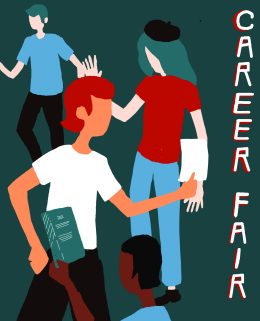
In a change from previous years, Binghamton University’s Fleishman Center for Career and Professional Development will hold four separate, industry-specific job and internship fairs this spring.
BU typically conducts one large Job and Internship Fair every fall and spring. However, these fairs have consistently been criticized for providing ample opportunities for students in the School of Management and the Watson School of Engineering while providing fewer options for students in Harpur College. Given that Harpur College students comprise the majority of the campus population, many have advocated for more employment opportunities for students of all majors.
In response to student and employer feedback, the Fleishman Center decided to pilot four smaller industry-specific fairs this semester. The fairs will be split into a student employment and summer opportunities fair; a common good, government, nonprofit and summer camps fair; a STEM fair; and a business and communications fair. The Center will collect feedback from attendees to figure out if the separate fairs should be implemented long term. According to Denise Lorenzetti, director of the Fleishman Center, the new system will grant students more opportunities tailored to their specific career interests as well as provide a chance to enhance their networking skills.
“As there is a national trend of fewer organizations traveling to college campuses, we are hoping this new format will be a great opportunity for students to connect with employers who can accelerate their entrance into the field or industry they want to break into,” Lorenzetti wrote in an email. “It is also the perfect place for those newer to networking to practice their skills in a more specialized environment.”
The Editorial Board commends the Fleishman Center for taking student and employer feedback into account, both in experimenting with the industry-specific fairs and in evaluating the reactions to the fairs after they conclude. Additionally, due to the limited scope — and thus smaller size — of the industry-specific fairs, they can be conducted at the University Union rather than the usual venue, the Events Center. We are glad that the central location is more convenient for students, who won’t have to worry about trekking to the edge of campus in their business attire.
Though we look forward to how the fairs will turn out, we are unsure of how effective the new model will be. Despite the separate fairs, there are still many majors that may slip through the cracks. For instance, we question how business and communications were pushed into the same fair. Lorenzetti wrote that the center conducted a gap analysis of student placement rates based on majors to determine how to split up the fairs, but the Editorial Board feels that many majors are still left out. Harpur College encompasses a large variety of majors, and the University should ensure that all of its students are given abundant opportunities to find employment.
Moreover, we are aware that the student career resources fee may possibly increase next year to support more Fleishman Center staff members and diversify its employer base. While this may help close the gaps in employment opportunities, the Editorial Board encourages the Fleishman Center to consider student feedback on the proposed increase just as it did for the job and internship fairs, especially since the increase may be almost double the current fee.
Overall, we support the Fleishman Center in trying out the new career fair format. Taking student feedback into account and responding accordingly is exactly what the University should be doing. We hope that the industry-specific fairs do what they set out to do in benefiting students of all majors. If they don’t, the Editorial Board expects the University to take the appropriate steps in guaranteeing sufficient opportunities for all its students.


